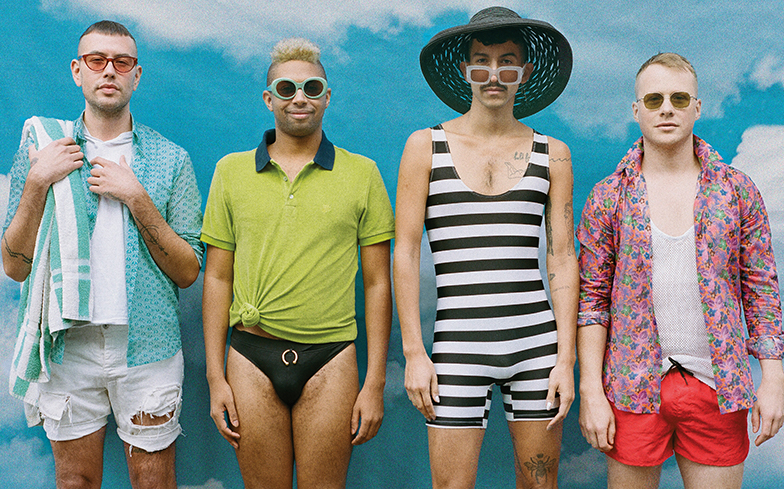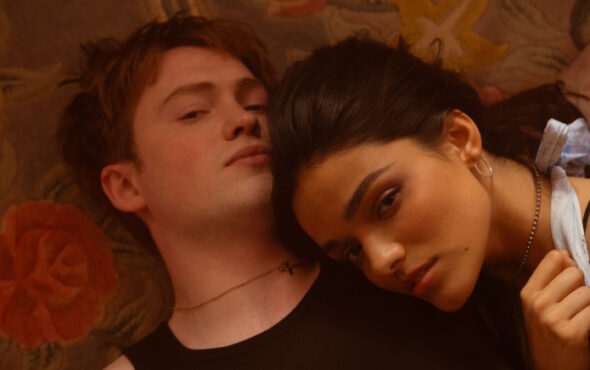
The four Thots themselves dish on the changing audioscape, sex positivity and of course what they like to read, and who they like to read.
In an age where bigotry runs rampant, orange ogres scream bile into worldwide megaphones, and trans people are STILL fighting for their mere existence, it’s important to highlight the lighter sides of our community. Starting back in early 2017, Food 4 Thot is an irreverent podcast that aims to do just this, combining political, critical, analytical thought with salacious tales of queer debauchery. Fran Tirado, Joe Osmundson, Dennis Norris II and Tommy Pico allow listeners into their world as they sip (read: gulp) rosé and regale each other with stories from their favourite authors to tips on removing poppers stains from the back seat of your car.
As queer people know all too well, reshaping the mould of our attributing stereotypes – or sidestepping them completely – is a difficult and daunting task. There’s safety in community and the ‘tribe’ we associate ourselves with, and this is often far more inviting than the solitary alternative. That’s why this podcast is so refreshing: an eclectic cocktail of wit, sass and a heavy emphasis on sex positivity runs thick in each unique conversation. We sat down with the four Thots themselves to talk all things thotty, the landscape of queer broadcasting and what’s next for this wildly successful podcast.
First of all, how did the four of you meet?
DN2: We were all students at a week-long writing workshop. Tommy and I were in the same dorm and met immediately, and he introduced me to Fran.
TP: So what you’re saying is that I discovered you.
DN2: There was a welcome cocktail party and the three of us walked in, frankly, owning the place with our outfits. Obviously, we were the queers, and Joe found us immediately.
JO: I knew that I either needed to make them love me, or they would destroy me.
DN2: Both happened in short order! The magic happened instantly.
FT: And Lemonade had just come out.
DN2: And we were truly not interested in anything other than proselytising Lemonade, and dancing to it. Anything else was quite frankly a waste of our time.
FT: Each night, we would gather out on the patio and drink rosé and talk about sex and race and gender theory and everything in between, and those were the primordial episodes of Food 4 Thot.
In honour of your podcast tagline, what are you reading at the moment, and more importantly who are you reading the most at the moment?
TP: I’m reading Weike Wang’s novel Chemistry, and I’m reading Joe on Twitter as often as possible. You’d think his account was hyperbolic but no. The binch is a crybaby.
DN2: This might be the gayest sentence I’ve ever said, but I’m reading Sally Field’s memoir, In Pieces. It’s spectacular and I love her! As far as reading goes, I try to carry the mantle of reading Joe in person. He’s a white cis-man with a PhD. He needs to be read.
FT: Ok I skimmed that memoir and it is great. I’m reading an advance copy of Jacob Tobia’s Sissy, and I am reading Joe as well, always and forever – it’s like breathing to me.
JO: I read Fran in a half a day and to be honest the jokes I read growing up in Reader’s Digest had more depth.
DN2: Bloop!

Image: Emily Lipson for Gay Times December 2018
Whose idea was it to start the podcast, and how did you turn it into reality?
TP: I initially came up with the idea as an excuse to see each other on the regs post-Tin House. You always make these plans like,’“oh yeah we’ll def meet up when we get back to New York,’ but it never happens. I promised them fame and fortune – JK – as a ploy to get them to hang out with me.
FT: I took the offer primarily for the fame and fortune.
DN2: And I took that offer for the free wine.
JO: It’s not free, Dennis! We pay for it every week…
DN2: What you call ‘paying for the wine every week’ I call ‘reparations.’
Why do you think that podcasts have had a resurgence in popularity recently?
JO: Capitalism, specifically of the venture type.
TP: He means smartphones.
DN2: Audio storytelling and conversation has an intimacy to it that I think other forms of media lack. There’s a closeness there.
FT: A closeness that manifests in a lot of dick pics in our email inbox.
DN2: Okay yes, but at the same time, the stakes aren’t as high as other mediums, like TV for instance, so there’s more freedom, which I think means that some people feel as though their lives and stories are better represented, meaning these folks are, ironically, more seen, in the podcast realm.

Image: Emily Lipson for Gay Times December 2018
And why do you think your unique blend of debauchery and critical, literary thought has been so popular?
TP: There’s something sort of sprightly alchemical about the conversion back and forth between ‘high’ and ‘low’ culture that comes naturally to the four of us because (and correct me if I’m wrong) we don’t actually see a distinction between the two.
FT: Exactly. Sluttery deserves its seat at the intellectual table.
TP: I think we’re all hip to the fact that distinctions like ‘high’ and ‘low’ are there to uphold a classist, patriarchal white supremacy. The people who fuck with us know that too. Our chemistry aside, we’re all smart, curious, moveable, ambitious, funny, caring, whores. Come sit with us!
DN2: I attended the after-party for the National Book Awards a few nights ago, and there were so many people of colour that came up to me and thanked me for the show, specifically because of this element of the show. Tommy’s right in that that false distinction seeks to narrow the stories that are considered valid. But our very existence, as individuals, negates that boundary. We exist, our stories exist, that alone is enough. That makes us, and our stories, valid.
FT: Also queer and marginalised folks — who are historically just less afraid of propriety and classist rules of good behaviour — just hadn’t seen themselves represented at all in the audioscape. The average podcast-listener has a higher household median income, is white, is straight. Our listeners were not getting content because that just isn’t the space. Turns out, they were thirsty for it!

Image: Emily Lipson for Gay Times December 2018
As queer people, we’ve been told most of our lives that sex for us was either sinful or literally a cause of death. How important is sex-positivity to you, and why do you speak on it so openly?
DN2: Real talk? Sex-positivity is an everyday struggle for me, for the exact reasons you’ve mentioned.
JO: Well also because you are a literal nun as of late.
DN2: No really! It’s easy to get caught up in shaming ourselves and others as we observe the thottery of the gay world. But it’s crucial we celebrate sex because we have every right to fuck as much as everyone else! We speak on it openly and frequently because sometimes shame and fear are so deeply ingrained that they take practice, effort, and affirmation to unlearn. We should all be living our lives like they’re golden!
FT: And taking it up the ass so hard your glasses fall off in an alleyway off West 17th street!
TP: And fellating mics like Jill Scott.
DN2: Listennnnnnnn…. The flip-side to waiting a long-ass time to lose your virginity (I was 27) is making up for it real-ass quick!
Speaking of sex-positivity, who’s the thottiest of the Thots?
FT: Joe.
DN2: Joe.
TP: Joe. I been on tour with this binch and let’s just say most nights mama was not at the Airbnb.
JO: I decline to comment at this time.
Has there been a fan favourite / standout impure thot?
JO: Two words: Taco Bell.
TP: Yeah, I think Taco Bell because it was a miracle of modern thottery.
DN2: I mean, if Cheesy Gordita Crunches could talk.
FT: I decline to comment at this time.
What has it been like on the ground in Tr*mp’s America, and how do you keep your resolve?
FT: Going to the movies alone.
JO: Live Tweeting my mental breakdowns. Therapy. Gin.
TP: Deleting social media regularly. Myvidster. IPAs.
DN2: I drink a cold glass of chardonnay in the shower.
In an age where being overtly queer is inherently a form of activism, how do you remain true to yourself and your mission whilst also taking care of your own mental wellbeing?
JO: Survival is revolutionary, but I don’t think being queer is a form of activism.
FT: Right. Being queer is inherently political, per se, but not activism.
JO: I just want to make sure we’re honouring the people out there risking literal life and limb to do that specific type of work, going into dangerous spaces for queer people to make them safer, or spending hours doing emotional and physical labor to change violent policies.
FT: Exactly. And maybe in a perfect world being queer would be less of a bipartisan issue but right now, not so much. For me, I set aside time every morning to thing about my long term goals to centre my life and not get lost in the noise.
JO: I’m a writer. I write. I’m a teacher, and so I teach. I imbue this labor with an activist spirit, and lift up the work of organisers as best I can. That helps me balance out the onslaught of never-ending horrifying push notifications. Also, running 10ks and sucking dick is bad for your knees but good for your spirit.
DN2: I have to constantly check myself to remember what my mission is sometimes, to be honest. It’s so easy to get caught up in mere survival, as opposed to trying to thrive, and it’s also too easy to spend too much time away from my mission because the world is a garbage fire. I can admit that I am still very much figuring out that balance.
TP: I go to the butt doctor.

Image: Emily Lipson for Gay Times December 2018
Do you think the queer representation is where it should be in the broadcasting sphere?
DN2: No. Not even close. So often the white cis gay male life is tangential to the straight narrative. So then, think what it’s like for those of us who are working class, of colour, femme, trans and GNC. I need our stories to be central and for that to not be remarkable.
TP: I think once people like us are in charge of making the decisions in the broadcasting sphere, more people like us will be represented. The great thing about podcasts though is there is more room for independent voices to be heard.
FT: Yes! Podcasting is a true democracy a lot of the time.
TP: Our first season was completely independently produced. We paid for our own studio time, our producers were people who really wanted this podcast to be in the universe… basically we each cashed the good will we’d developed in our professional lives to get a bunch of like minded people into what we made, and it paid off.
FT: But until queer and marginalised people get the exact same green lights, the exact same resources as white straight people, our work will always be harder! That’s just the fact of it.
Who are your queer icons?
DN2: James Baldwin and Langston Hughes. Rudy Galindo. The character Emmett Honeycutt from Queer as Folk.
JO: Fran Tirado
Fran: Aw! I would say you, but instead I’m gonna say Cher.
TP: Garfield
FT: Oh! Also Miss Piggy.
How do each of you thrive at the intersection of your various identities?
TP: My strategy is to saturate myself with my various identities, indigenous/queer/city mouse/poet etc. so that I can’t be reduced to a single one. You’d think it would make someone more fractured but I’d like to think that it makes for distinction. Then I let someone motorboat my cakes.
FT: I thrive, in that I eat burritos multiple times a week.
DN2: I have a prayin’ Mama, so that helps. I always tell people I’m not a pie. You can’t just cut a slice of me to make me more palatable. I think that to myself on an almost-daily basis. I also say to myself on repeat “Who gon’ check me boo?” (a la Sheree Whitfield) when I’m trying to shift my thinking from survival mode to thriving mode.
JO: You’re asking me if I thrive…. in my whiteness?

Image: Emily Lipson for Gay Times December 2018
Do you have any advice for people who want to start their own podcast?
JO: Lol, don’t.
FT: Seconded, please don’t make any more podcasts.
TP: Make it be about something that you already do, and get started yesterday. Don’t obsess too much about having the perfect set up or the perfect chemistry or the perfect flow. Literally just start, and keep going. It took us several dummy episodes in Joe’s apartment (that you will never hear) and probably for or five studio sessions before we really got into our groove.
DN2: Be brave at the mic. It’s an intimate thing, so be real.
When are you bringing F4T on tour to Europe?
JO: When my ex doesn’t live there anymore.
DN2: When someone duct tapes Joe’s mouth shut?
TP: When somebody slides into the direct deposit.
FT: Yes someone please pay us to go to Italy and make fun of Italian accents live on stage.
What’s next for the Thots?
TP: I have a new book coming out next year and I’m writing a few feature scripts, fingers crossed! Also I think I’m on the verge of wanting one of those relationship things? I dunno, it’s like how ppl’s joints ache before a storm. It’s weird for me because I’m such a solo binch so, you know, reach out (if yr freakishly tall).
DN2: I’m working really hard to finish my debut novel and there are some really exciting things happening with that so that is my focus. I’m also single AF, and while I’m not really looking…. I’m looking. Just a lil bit.
FT: I’m working on a book of essays, a screenplay, a handful of secret projects, and I just took on the task of rebranding and relaunching Out magazine as their Deputy Editor, which will take over my life in the best way possible.
JO: Please continue to follow my sad Twitter journey @reluctantlyjoe!
You can subscribe to Food 4 Thot here.
Photography: Emily Lipson
Fashion: Yety Akinola
Styling Assistant: Bria Cannon



